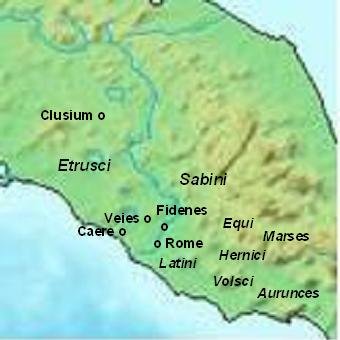Aequi
The Aequi were an ancient mountainous Italian tribe that inhabited the valleys of the Tolenus and Upper Aniene rivers, as well as the western shore of Lake Fucinus, between the regions of the Sabines, Latins, Marsi, and Hernici. In the 5th and 4th centuries BCE, the Aequi, often in alliance with the Volsci, engaged in continuous wars with the Romans. In 304 BCE, their territory was conquered, and the Romans captured 41 cities. Among the more significant cities mentioned are Carsioli and Alba Fucens (later annexed to the Marsi region). A small portion of the Aequi territory was known as Aequiculani (from Latin, meaning "small Aequi") and was considered a municipium. The question of the Aequi's tribal origin is still debated: some consider them to be related to the Volsci, while others classify them as Oscan.
 The Ekw Tribes
The Ekw Tribes
Wars with the Aequi
Parallel to the wars with Veii, Rome continued to clash with the Volsci, Aequi, and Sabines. These were small border wars, greatly inflated by tradition. Thanks to the triple alliance, Rome and the Latins achieved some success in their struggle against these peoples.
Among the many legends preserved by tradition, the story of Cincinnatus gained worldwide fame. According to Livy, in 458 BCE, during a severe war with the Aequi and Sabines, Lucius Quinctius Cincinnatus was appointed dictator.
"The following must be heard by those who despise all human blessings except wealth," says Livy (III, 26). The senators' envoys found the dictator working on a four-acre plot of land, which he was cultivating with his own hands. Brushing off the dust and sweat and donning the toga brought to him by his wife, Cincinnatus listened to the envoys. He immediately went to Rome, defeated the enemies, and on the 16th day, after relinquishing his dictatorship, returned to his field. This tradition, perhaps legendary, is interesting as an example of ancient Roman simplicity of manners.
The results of the foreign policy of the 5th century BCE, which began in such an unfavorable situation for Rome, were significant: Rome destroyed its main opponent in southern Etruria and significantly expanded its territory. Thanks to the alliance with the Latins and Hernici, it managed to halt the eastern pressure and even take the offensive. But most importantly, Rome, whose territory now represented a relatively large and contiguous piece, gained significant strategic advantage over its allies, whose possessions were scattered. This advantage became evident immediately after the suppression of the Gallic devastation.


